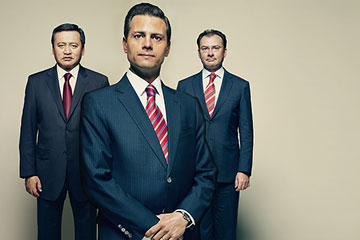
Left to right: Miguel Ángel Osorio Chong, Interior Minister; Enrique Peña Nieto, President; Luis Videgaray Caso, Finance Minister
(3 of 5)
"Traitors! traitors!" came the shouts from inside Mexico's Congress on Dec. 12. Opponents of a measure allowing foreign investment in Mexico's oil sector had barricaded and padlocked the lower house of Congress, forcing the debate into a nearby auditorium. One legislator stripped down to a pair of black underpants as he railed at the lectern about the stripping of his nation.
The passion stems from the politically charged history of oil in Mexico, which holds the world's 11th largest reserves, right behind Brazil in the western hemisphere. A large monument and fountain near the center of Mexico City commemorate the day in 1938 that President Lázaro Cárdenas, fed up with American and British oil companies' siphoning profits away from Mexican soil, declared that Mexico's oil belonged to its people and could not be owned by foreigners. Mexico celebrates the nationalization of its oil with a civic holiday every March 18.
But national pride meant that Mexico missed out on the global energy boom. While oil prices have roughly quadrupled over the past decade, enriching big producers, Mexican oil production dropped by 25%, thanks to the sclerotic federal oil enterprise, Pemex, which lacks the capital and expertise to tap the country's reserves. "They've recognized that the government monopolies have stopped working and that they have fallen behind in taking advantage of what entrepreneurship and private capital can do," says Ed Morse, head of global commodities research at Citibank. Meanwhile, a U.S. oil-production boom has reduced Mexican petroleum exports to the lower 48 states, forcing Mexico to look elsewhere for markets.
Under the new law, foreigners will again be able to explore for oil in Mexico and extract Mexican crude for profit, even if the oil technically still belongs to the people--a point Peña Nieto is careful to underscore. "The world has changed, and especially the energy sector has changed," he says, rebutting the suggestion that he has allowed his country to be stripped to its skivvies. "The state does not compromise in its view that the property continues to be owned by Mexico. It belongs to all Mexicans."
For all its drama, the oil reform might not even be Peña Nieto's most important victory. In fact, the uproar against his education reform was even more intense than the battle over oil. A law overhauling Mexico's absurdly deficient public-education system--in which teaching jobs are handed down through generations and are sometimes even sold--enraged the powerful teachers' union, whose members paralyzed central Mexico City with mass street demonstrations last September.
There's also evidence that Peña Nieto will challenge Mexico's entrenched powers. Last year he ordered the arrest of the longtime and powerful leader of the teachers' union on charges of embezzling millions in union funds. And some observers say his telecom-reform plan doesn't please telecom mogul Carlos Slim, the country's richest man.
Factor in a law that rejiggers the tax code and an end to single-term limits for all federal politicians, and you have what might be the most productive legislative session anywhere in recent history. "You have to give them extraordinary marks for both political instinct and management of the process," says Tony Garza, a U.S. ambassador to Mexico under George W. Bush.
